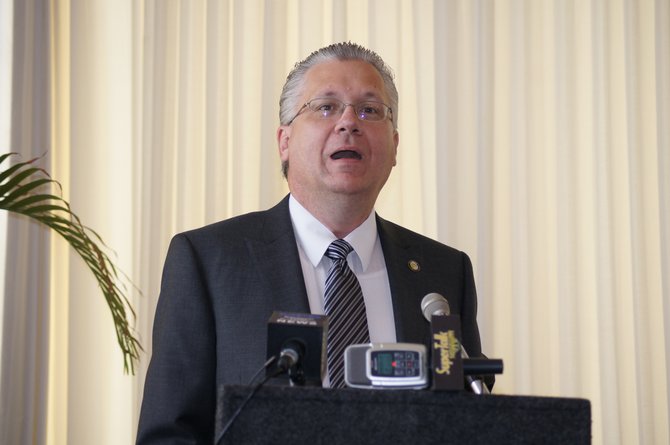Rickey Cole, the chairman of the Mississippi Democratic Party, said Dems certified former Republican Bill Marcy to run as a Democrat because he met all the state legal requirements. Photo by R.L. Nave.
It might not contain all of the melodrama now playing out between Mississippi Republicans, but the Mississippi Democratic Party was having to deal with its own, smaller, civil war—and all because of a Republican.
Ken Dale Sullivan, a Democrat who lives in Wesson, has twice run for a seat in the Mississippi Legislature—for the House in 2007 against Rep. Becky Currie, R-Brookhaven, and for an open seat in the Senate in 2011. He sued his party earlier this month for allowing Bill Marcy's name to appear on the party primary ballot as a Democrat for U.S. Senate.
Marcy lives in Jackson and ran as a Republican in 2012 against eight-term Democratic Congressman Bennie Thompson. In Sullivan's complaint, filed in Copiah County Chancery Court earlier this month, he argues that Marcy should not have been certified to compete as a Democrat because he is "not in accord wit the principles and the rules" of the party as outlined by the party's constitutional bylaws.
"It makes our party look weak," he told the Jackson Free Press in a recent telephone interview.
On April 17, the court dismissed Sullivan's suit. In his motion, Sullivan points to statements Marcy made against Thompson two years ago in public appearances and in his campaign literature. Marcy's website from that race remains active and states, "Bill Marcy is a committed Fiscal and Social Conservative" and that "Bennie Thompson has demonstrated his support for the Liberal Agenda time and time again."
"It is clear that the longer elected officials stay in Washington, D.C., the more out of touch they become. Representative Thompson has been in Washington long enough and it is time to send him home," Marcy's site states.
Marcy has said that he is merely switching party labels and has complained in the past about not receiving support from state and national Republicans in previous bids to unseat Democrats.
Former U.S. Rep. Travis Childers, a conservative Democrat from north Mississippi who lost his congressional seat to Republican Alan Nunnelee in 2010, is aiming for the Democratic nomination for Senate.
Sullivan told the JFP that he had assurances from party officials that, for these reasons, Marcy's petition to be added on the ballot would not be certified. Rickey Cole, the state Democratic chairman, said he could not comment on conversations he had with Sullivan, citing the ongoing litigation.
Democrats responded by asking a court to dismiss Sullivan's suit on the grounds the chancery court lacks power to consider the complaint and that Sullivan failed to contest Marcy's qualification through official party channels.
Sullivan, who is representing himself in the case, writes in his complaint that Marcy "has described the Democratic Party as the party of slavery, segregation and bigotry."
In fact, Sullivan also has an interesting history with slavery. In 2013, Sullivan helped Mississippi ratify the 13th Amendment, which outlawed slavery in the U.S., 148 years after the Civil War ended when a friend of Sullivan's the discovered the Federal Register, for unknown reasons, never received Mississippi's paperwork to ratify the amendment.
Cole, the Democratic chairman, said the 80-member executive committee determined that Marcy met the statutory requirements to appear on the ballot under state law. Mississippi Democrats have been burned by trying to kick people off the ballot before. In 2007, Democrats attempted to boot longtime Democratic Insurance Commissioner George Dale off the primary ballot for publicly supporting then-President George W. Bush, a Republican, for re-election. A judge later ordered Dale back onto the ballot, but he lost the primary to Gary Anderson, who ultimately lost the election to Republican Mike Chaney.
In certifying Marcy, Cole said little discussion took place before the committee approved his petition on a voice vote.
"We went through our process," Cole said, adding that Republicans went through a similar ordeal in qualifying Gene Taylor to compete in the GOP primary. Taylor is a former Democratic congressman from the Coast, who lost the seat in 2010 to Steven Palazzo.
After Taylor announced that he would switch parties and challenge Palazzo as a Republican, the party's state executive committee, a 25-10 vote, certified Taylor to appear on the ballot for the primary.
Joe Nosef, the state Republican Party chairman, thought it would be better to avoid a court battle and let the people of the 4th Congressional District sort it out.



Comments
Use the comment form below to begin a discussion about this content.
comments powered by Disqus